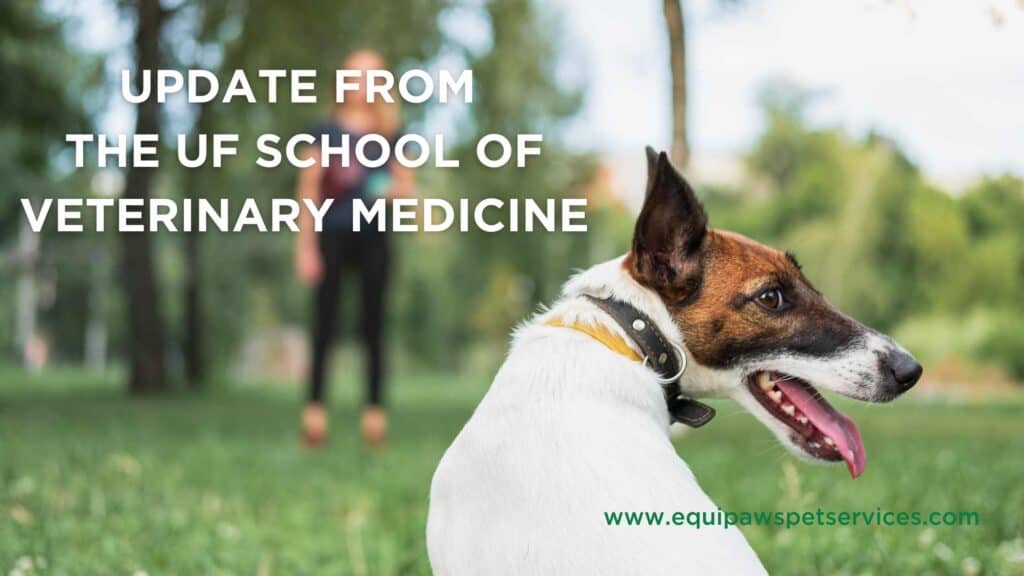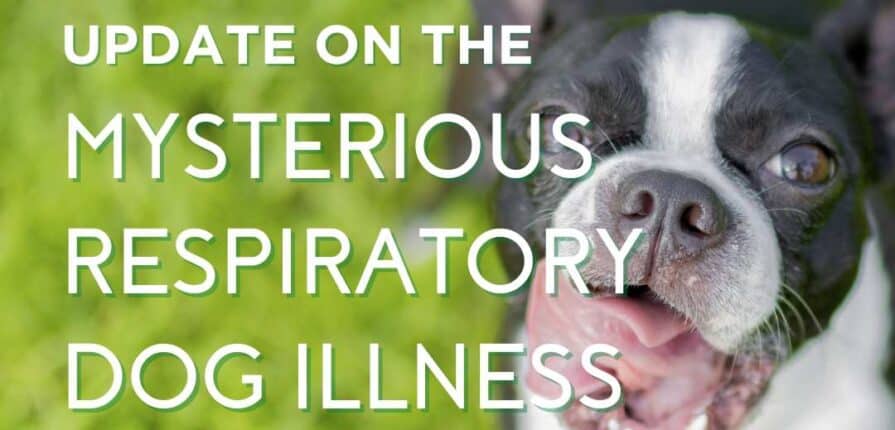
We reached out to the Florida Veterinary Medical Association for an update on the canine respiratory illness spreading across the United States. They returned our emails today:
Important Update: Canine Respiratory Infections Reportedly Spreading Across the U.S.
“Veterinarians across the U.S. report they are encountering a surge in the number of dogs presenting with acute respiratory infections, ranging from mild cases to life-threatening pneumonia.
While the diagnostic testing is often negative for known canine pathogens and the disease is reportedly nonresponsive to first-line antibiotics, it is not clear if this event is a novel pathogen or a well-known disease such as Canine Infectious Respiratory Disease Complex (CIRDC, also known as “kennel cough”).
The University of Florida College of Veterinary Medicine (UFCVM) has issued a statement on the subject and is updating its recommendations as more information develops. While much is unknown about reported atypical CIRDC, basic disease control and treatment protocols as described in the below URL will help keep dogs safe and provide a roadmap for diagnosis and treatment.
Please bookmark this URL for immediate access to the latest updates: https://sheltermedicine.
vetmed.ufl.edu/2023/11/27/ mysterious-respiratory- disease/ At this time, UFCVM and the FVMA recommend vigilance in identifying and segregating dogs with signs of respiratory illness.
Veterinarians may request a consultation with a UF specialist concerning any dog currently under their treatment by calling (352) 392-2235.”
What this means for our dog-friendly events:
We will still be hosting the December 7th AKC Fit Dog Walk and Yappy Hour and the December 15th Movie Night at the Barnacle Historic State Park. Dogs are optional- you may bring them, but we will be enforcing social distancing for the pups. There is plenty of room for them where we’re going. We would love to see everyone before the holiday, so come out with or without your pups. Let’s enjoy each other’s company! We’ve also gone over how we’re keeping your pets safe during our dog walks and pet sits in our blog on the canine respiratory illness here.
Excerpt from the University of Florida’s Shelter Medicine Update:
“Veterinarians are reporting an increased number of dogs presenting with acute respiratory infections ranging from mild and self-limiting to life-threatening pneumonia. The disease is reportedly nonresponsive to commonly prescribed antibiotics, and diagnostic testing is often negative for known canine pathogens.
It is not yet clear if this is caused by a novel emerging pathogen or one of the well-known causes of Canine Infectious Respiratory Disease Complex (CIRDC casually known as “kennel cough”). The lack of a centralized reporting system means it’s not even possible to confirm that there is a spike in CIRDC incidence or severity. The intense media coverage of a “mystery disease” may be raising awareness and discussion about CIRDC cases that would otherwise be managed as usual. It’s also possible that localized clusters are occurring due to one or more known pathogens due to some predisposing factor, such as an asymptomatically infected dog visiting a dog park, day care, dog show, or boarding kennel, etc.
Many of the cases suspected to have “atypical CIRDC” have not had diagnostic testing. Some were tested, but only after weeks of resolving cough. That’s too late to detect some of the most likely culprits, such as influenza virus, pneumovirus, and respiratory coronavirus. And many were tested with a respiratory panel at a large diagnostic lab that does not include pneumovirus, which could be causing the disease in some dogs. Researchers are also looking into the possibility of emerging or increasingly virulent pathogens.
H3N2 CIV is currently circulating along the eastern and western coasts as documented in show dogs and shelters. Although most cases of atypical CIRDC have been reported in privately owned dogs seen at veterinary clinics, the Shelter Medicine Program at the University of Florida is currently working with several shelters with highly contagious pneumovirus and/or Streptococcus equi subsp. zooepidemicus across the country. While these pathogens are familiar to shelters, many private practitioners may not have diagnosed them before. Both cause pneumonia that can progress to a life-threatening situation. Co-infections with multiple pathogens can be especially debilitating.
At this time, we recommend being especially vigilant to identify and segregate dogs with respiratory signs. Respiratory PCR panels should be submitted within 4 days of the first clinical signs, especially in dogs recently exposed to other dogs. Visits with other dog populations should be minimized, and dogs should be kept current on DHPP and CIRC vaccinations (including CIV for owned pets).
While much is unknown about reported atypical CIRDC, basic disease control, and treatment protocols as described below will help keep dogs safe and provide a roadmap for diagnosis and treatment.
Dogs at Risk
- Dogs that visit with other dogs, such as boarding, daycare, dog shows, and dog parks
- Suspect cases have been reported in at least 12 states, including Florida
- So far, animal shelters seem to be less frequently affected by unknown pathogens, although historic levels of crowding present risks for outbreaks
- People and other species have not been reported to be at risk
Clinical Signs
- Highly contagious, rapidly spreading among dogs in contact with other dogs
- Acute cough, sneezing, nasal discharge, eye discharge, fever, anorexia, lethargy
- Severe form can progress to life-threatening pneumonia requiring oxygen and ventilator support
- Cough may persist for weeks to months
Diagnosis
-
Swabs for PCR testing should be collected within 4 days of the first clinical signs to avoid missing pathogens with short shedding periods such as CIV, Pneumovirus, and respiratory coronavirus
-
Respiratory PCR panels should include Bordetella bronchiseptica, Canine adenovirus type 2, Canine distemper virus, Canine herpesvirus (CHV-1), Canine parainfluenza virus, Canine pneumovirus, Canine respiratory coronavirus (CRCoV), Influenza A virus, Mycoplasma cynos, and Streptococcus equi subsp. zooepidemicus
-
Respiratory cultures may be indicated for suspected bacterial infection not responsive to first-line treatment
-
The three major commercial diagnostic laboratories offer respiratory PCR panels for the following pathogens…”

A founding member of the Equipaws family, Frankie can mostly be found working behind the scenes, helping co-create online branding, managing several social media accounts, designing brand collateral, writing copy, and managing events. She also fills in for pet sitters and dog walkers when needed in Palmetto Bay, Pinecrest, and South Miami. Her own small pack consists of Boots the Shih Tzu mix and Nutmeg the Chiweenie.

